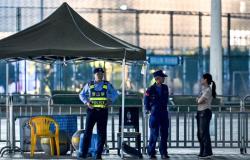The Minister of the Environment, Benoit Charette, and the Minister of Energy, Christine Fréchette, announced on Monday “a plan to achieve 100% renewable energy by 2040”.
The aim is to remove fossil fuels from heating buildings and ensure a transition to renewable energy, while taking into account Quebec’s energy supply capacities
.
These new rules, announced in a press release, aim to regulate the use of natural gas in residential, commercial and institutional buildings, both new and existing.
Thus, Quebec will prohibit the use of fossil natural gas for heating new buildings and will force distributors to prioritize gas from renewable sources.
This plan for use only 100% renewable energies by 2040
is announced on the sidelines of the Baku conference on climate change (COP29), which will end on Friday.
The objective is to plan the withdrawal of fossil fuels for heating buildings and to ensure an orderly transition to renewable energies, while taking into account Quebec’s energy supply capacities.
Minister Charette affirms that, in the fight against climate change, every sector must contribute, including buildings
.
After regulating fuel oil, we are now targeting natural gas, another fossil fuel.
The Legault government’s approach combines energy efficiency, electrification, dual energy and the optimal use of other renewable energy sources such as renewable gas (GSR) in the decarbonization of buildings
.
The government says it is introducing these new rules with its partners in the energy sector and with municipalities
. Son plan is inspired by municipal regulations in force for new residential buildings
.
Several municipalities have already banned the installation of gas systems in new residences. In the Laurentians, Prévost was the first to do so.
In April, the council of the Metropolitan Community of Montreal (CMM) adopted a regulation to ban fossil fuels, particularly natural gas, in new construction and new buildings. Monday, the CMM a greeted
the Quebec project, but said preoccupied
by its schedule, while the climate emergency requires concrete results by 2030
.
Furthermore, the CMM calls on the Ministry of the Environment to approve its draft regulation, so that it can come into force on January 1st as planned.
The main supplier of natural gas in Quebec, Énergir welcomes the regulatory changes proposed by Quebec because this vision is consistent with its own: Since April 2024, all new customers in the residential, commercial or institutional sectors who connect to the Énergir network for the first time must opt for 100% renewable energy, that is to say 100% renewable natural gas (RNG). ) or a dual-energy electricity-RNG configuration.
Two regulatory changes
Open in full screen mode
Under the regulatory changes planned by the Quebec government, distributors like Énergir will have to increase the percentage of gas from renewable sources, produced from organic waste, for example. (Archive photo)
Photo: The Canadian Press / Christine Muschi
On the one hand, the changes concern the Regulation respecting oil heating appliances, the scope of which will be broadened to prohibit the installation of natural gas heating appliances in new residential buildings of less than 600 m2 and three floors or less, in order to prioritize electrification.
An exclusion will be made in Outaouais, where Gazenfere is committed to submitting a decarbonization plan for the entire buildings sector to the Régie de l’énergie.
On the other hand, Quebec will improve the Regulation concerning the quantity of gas from renewable sources that must be delivered by a distributor. Gas companies will gradually have to reduce the quantity of fossil natural gas delivered to residential, commercial and institutional consumers.
Distributors will therefore have to increase the percentage of gas from renewable sources (GSR) in existing buildings powered by natural gas to achieve a 100% renewable supply, with the exception of the residential sector for Outaouais.
Distributors, like Énergir, will therefore have to increase the percentage of gas from renewable sources produced from organic waste, for example.
These two regulatory changes will be subject to consultation next year and the government is targeting 2026 for their entry into force.
These new measures are part of the Plan for a Green Economy (PEV) through which the Legault government wishes to reduce its GES. Quebec says it has invested nearly $900 million to achieve its energy sobriety and efficiency targets.
Of the steppettes
to counter climate change
In interview at Midi info on ICI Première, Monday, Pierre-Olivier Pineau, holder of the Chair of energy sector management at HEC Montréal, was critical. Rather than add
et to write new regulations
says Mr. Pineau, Quebec should improve the tools it already has, such as carbon pricing, which already applies to natural gas
et the law which is supposed to improve the energy performance of buildings in Quebec
.
Mr. Pineau points out that we are not really banning natural gas, since it will remain in the industrial sector. We want to give the impression that we are acting
he decries, describing the government’s actions as steppettes
in the fight against climate change.
The Montreal Economic Institute (IEDM), an organization partly financed by the oil industry, believes that Quebec still needs gas heating
.
In a press release, Gabriel Giguère, political analyst atIEDMdenounces that Quebec still has to suffer froma lack of electricity, with all the harmful effects that this has on its development
.
For its part, the Union of Municipalities of Quebec (UMQ) supports Quebec’s desire to regulate natural gas in buildings to achieve greenhouse gas (GHG) reduction targets in this sector. Reducing and eventually eliminating the use of fossil fuels are priorities for theUMQwhich already supports its members in this area, both from a regulatory point of view and that of the decarbonization of their building stocks and the production of renewable energies.
L’UMQ underlines that municipalities and the government have the common objective of achieving carbon neutrality by 2050.
A great day for climate action in Quebec
For its part, the Let’s Get Out the Gas coalition says happy
that the Quebec government finally passes from words to actions
. But at the same time, she deplores that the government continues to get bogged down in the pitfalls of dual energy and renewable gas (GSR)
.
The Suzuki Foundation and Équiterre, both members of the coalition, also reacted. For the political analyst of the David Suzuki Foundation, Andréanne Brazeau, it’s a great day for climate action in Quebec
. It is abouta strong signal to the markets, to Quebecers and to the entire planet
.
Ms. Brazeau, however, deplores that the industrial sector is excluded from these new measures
.
Charles-Edouard Têtu, climate and energy policy analyst at Équiterre, says this is an announcement of capital importance
. However, vigilance will be required to ensure that recourse to GSR does not become a crutch to continue supplying the network with fossil gas.
With information from The Canadian Press





